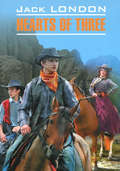
Джек Лондон
The Faith of Men
With the coming of Jees Uck, at once things brightened up. She was regal in her happiness, a source of unending delight. The elemental workings of her mind and her naive little ways made an immense sum of pleasurable surprise to the over-civilized man that had stooped to catch her up. Not alone was she solace to his loneliness, but her primitiveness rejuvenated his jaded mind. It was as though, after long wandering, he had returned to pillow his head in the lap of Mother Earth. In short, in Jees Uck he found the youth of the world – the youth and the strength and the joy.
And to fill the full round of his need, and that they might not see overmuch of each other, there arrived at Twenty Mile one Sandy MacPherson, as companionable a man as ever whistled along the trail or raised a ballad by a camp-fire. A Jesuit priest had run into his camp, a couple of hundred miles up the Yukon, in the nick of time to say a last word over the body of Sandy’s partner. And on departing, the priest had said, “My son, you will be lonely now.” And Sandy had bowed his head brokenly. “At Twenty Mile,” the priest added, “there is a lonely man. You have need of each other, my son.”
So it was that Sandy became a welcome third at the post, brother to the man and woman that resided there. He took Bonner moose-hunting and wolf-trapping; and, in return, Bonner resurrected a battered and way-worn volume and made him friends with Shakespeare, till Sandy declaimed iambic pentameters to his sled-dogs whenever they waxed mutinous. And of the long evenings they played cribbage and talked and disagreed about the universe, the while Jees Uck rocked matronly in an easy-chair and darned their moccasins and socks.
Spring came. The sun shot up out of the south. The land exchanged its austere robes for the garb of a smiling wanton. Everywhere light laughed and life invited. The days stretched out their balmy length and the nights passed from blinks of darkness to no darkness at all. The river bared its bosom, and snorting steamboats challenged the wilderness. There were stir and bustle, new faces, and fresh facts. An assistant arrived at Twenty Mile, and Sandy MacPherson wandered off with a bunch of prospectors to invade the Koyokuk country. And there were newspapers and magazines and letters for Neil Bonner. And Jees Uck looked on in worriment, for she knew his kindred talked with him across the world.
Without much shock, it came to him that his father was dead. There was a sweet letter of forgiveness, dictated in his last hours. There were official letters from the Company, graciously ordering him to turn the post over to the assistant and permitting him to depart at his earliest pleasure. A long, legal affair from the lawyers informed him of interminable lists of stocks and bonds, real estate, rents, and chattels that were his by his father’s will. And a dainty bit of stationery, sealed and monogramed, implored dear Neil’s return to his heart-broken and loving mother.
Neil Bonner did some swift thinking, and when the Yukon Belle coughed in to the bank on her way down to Bering Sea, he departed – departed with the ancient lie of quick return young and blithe on his lips.
“I’ll come back, dear Jees Uck, before the first snow flies,” he promised her, between the last kisses at the gang-plank.
And not only did he promise, but, like the majority of men under the same circumstances, he really meant it. To John Thompson, the new agent, he gave orders for the extension of unlimited credit to his wife, Jees Uck. Also, with his last look from the deck of the Yukon Belle, he saw a dozen men at work rearing the logs that were to make the most comfortable house along a thousand miles of river front – the house of Jees Uck, and likewise the house of Neil Bonner – ere the first flurry of snow. For he fully and fondly meant to come back. Jees Uck was dear to him, and, further, a golden future awaited the north. With his father’s money he intended to verify that future. An ambitious dream allured him. With his four years of experience, and aided by the friendly coöperation of the P. C. Company, he would return to become the Rhodes of Alaska. And he would return, fast as steam could drive, as soon as he had put into shape the affairs of his father, whom he had never known, and comforted his mother, whom he had forgotten.
There was much ado when Neil Bonner came back from the Arctic. The fires were lighted and the fleshpots slung, and he took of it all and called it good. Not only was he bronzed and creased, but he was a new man under his skin, with a grip on things and a seriousness and control. His old companions were amazed when he declined to hit up the pace in the good old way, while his father’s crony rubbed hands gleefully, and became an authority upon the reclamation of wayward and idle youth.
For four years Neil Bonner’s mind had lain fallow. Little that was new had been added to it, but it had undergone a process of selection. It had, so to say, been purged of the trivial and superfluous. He had lived quick years, down in the world; and, up in the wilds, time had been given him to organize the confused mass of his experiences. His superficial standards had been flung to the winds and new standards erected on deeper and broader generalizations. Concerning civilization, he had gone away with one set of values, had returned with another set of values. Aided, also, by the earth smells in his nostrils and the earth sights in his eyes, he laid hold of the inner significance of civilization, beholding with clear vision its futilities and powers. It was a simple little philosophy he evolved. Clean living was the way to grace. Duty performed was sanctification. One must live clean and do his duty in order that he might work. Work was salvation. And to work toward life abundant, and more abundant, was to be in line with the scheme of things and the will of God.
Primarily, he was of the city. And his fresh earth grip and virile conception of humanity gave him a finer sense of civilization and endeared civilization to him. Day by day the people of the city clung closer to him and the world loomed more colossal. And, day by day, Alaska grew more remote and less real. And then he met Kitty Sharon – a woman of his own flesh and blood and kind; a woman who put her hand into his hand and drew him to her, till he forgot the day and hour and the time of the year the first snow flies on the Yukon.
Jees Uck moved into her grand log-house and dreamed away three golden summer months. Then came the autumn, post-haste before the down rush of winter. The air grew thin and sharp, the days thin and short. The river ran sluggishly, and skin ice formed in the quiet eddies. All migratory life departed south, and silence fell upon the land. The first snow flurries came, and the last homing steamboat bucked desperately into the running mush ice. Then came the hard ice, solid cakes and sheets, till the Yukon ran level with its banks. And when all this ceased the river stood still and the blinking days lost themselves in the darkness.
John Thompson, the new agent, laughed; but Jees Uck had faith in the mischances of sea and river. Neil Bonner might be frozen in anywhere between Chilkoot Pass and St. Michael’s, for the last travellers of the year are always caught by the ice, when they exchange boat for sled and dash on through the long hours behind the flying dogs.
But no flying dogs came up the trail, nor down the trail, to Twenty Mile. And John Thompson told Jees Uck, with a certain gladness ill concealed, that Bonner would never come back again. Also, and brutally, he suggested his own eligibility. Jees Uck laughed in his face and went back to her grand log-house. But when midwinter came, when hope dies down and life is at its lowest ebb, Jees Uck found she had no credit at the store. This was Thompson’s doing, and he rubbed his hands, and walked up and down, and came to his door and looked up at Jees Uck’s house and waited. And he continued to wait. She sold her dog-team to a party of miners and paid cash for her food. And when Thompson refused to honour even her coin, Toyaat Indians made her purchases, and sledded them up to her house in the dark.
In February the first post came in over the ice, and John Thompson read in the society column of a five-months-old paper of the marriage of Neil Bonner and Kitty Sharon. Jees Uck held the door ajar and him outside while he imparted the information; and, when he had done, laughed pridefully and did not believe. In March, and all alone, she gave birth to a man-child, a brave bit of new life at which she marvelled. And at that hour, a year later, Neil Bonner sat by another bed, marvelling at another bit of new life that had fared into the world.
The snow went off the ground and the ice broke out of the Yukon. The sun journeyed north, and journeyed south again; and, the money from the being spent, Jees Uck went back to her own people. Oche Ish, a shrewd hunter, proposed to kill the meat for her and her babe, and catch the salmon, if she would marry him. And Imego and Hah Yo and Wy Nooch, husky young hunters all, made similar proposals. But she elected to live alone and seek her own meat and fish. She sewed moccasins and parkas and mittens – warm, serviceable things, and pleasing to the eye, withal, what of the ornamental hair-tufts and bead-work. These she sold to the miners, who were drifting faster into the land each year. And not only did she win food that was good and plentiful, but she laid money by, and one day took passage on the Yukon Belle down the river.
At St. Michael’s she washed dishes in the kitchen of the post. The servants of the Company wondered at the remarkable woman with the remarkable child, though they asked no questions and she vouchsafed nothing. But just before Bering Sea closed in for the year, she bought a passage south on a strayed sealing schooner. That winter she cooked for Captain Markheim’s household at Unalaska, and in the spring continued south to Sitka on a whisky sloop. Later on appeared at Metlakahtla, which is near to St. Mary’s on the end of the Pan-Handle, where she worked in the cannery through the salmon season. When autumn came and the Siwash fishermen prepared to return to Puget Sound, she embarked with a couple of families in a big cedar canoe; and with them she threaded the hazardous chaos of the Alaskan and Canadian coasts, till the Straits of Juan de Fuca were passed and she led her boy by the hand up the hard pave of Seattle.
There she met Sandy MacPherson, on a windy corner, very much surprised and, when he had heard her story, very wroth – not so wroth as he might have been, had he known of Kitty Sharon; but of her Jees Uck breathed not a word, for she had never believed. Sandy, who read commonplace and sordid desertion into the circumstance, strove to dissuade her from her trip to San Francisco, where Neil Bonner was supposed to live when he was at home. And, having striven, he made her comfortable, bought her tickets and saw her off, the while smiling in her face and muttering “dam-shame” into his beard.
With roar and rumble, through daylight and dark, swaying and lurching between the dawns, soaring into the winter snows and sinking to summer valleys, skirting depths, leaping chasms, piercing mountains, Jees Uck and her boy were hurled south. But she had no fear of the iron stallion; nor was she stunned by this masterful civilization of Neil Bonner’s people. It seemed, rather, that she saw with greater clearness the wonder that a man of such godlike race had held her in his arms. The screaming medley of San Francisco, with its restless shipping, belching factories, and thundering traffic, did not confuse her; instead, she comprehended swiftly the pitiful sordidness of Twenty Mile and the skin-lodged Toyaat village. And she looked down at the boy that clutched her hand and wondered that she had borne him by such a man.
She paid the hack-driver five pieces and went up the stone steps of Neil Bonner’s front door. A slant-eyed Japanese parleyed with her for a fruitless space, then led her inside and disappeared. She remained in the hall, which to her simply fancy seemed to be the guest-room – the show-place wherein were arrayed all the household treasures with the frank purpose of parade and dazzlement. The walls and ceiling were of oiled and panelled redwood. The floor was more glassy than glare-ice, and she sought standing place on one of the great skins that gave a sense of security to the polished surface. A huge fireplace – an extravagant fireplace, she deemed it – yawned in the farther wall. A flood of light, mellowed by stained glass, fell across the room, and from the far end came the white gleam of a marble figure.
This much she saw, and more, when the slant-eyed servant led the way past another room – of which she caught a fleeting glance – and into a third, both of which dimmed the brave show of the entrance hall. And to her eyes the great house seemed to hold out the promise of endless similar rooms. There was such length and breadth to them, and the ceilings were so far away! For the first time since her advent into the white man’s civilization, a feeling of awe laid hold of her. Neil, her Neil, lived in this house, breathed the air of it, and lay down at night and slept! It was beautiful, all this that she saw, and it pleased her; but she felt, also, the wisdom and mastery behind. It was the concrete expression of power in terms of beauty, and it was the power that she unerringly divined.
And then came a woman, queenly tall, crowned with a glory of hair that was like a golden sun. She seemed to come toward Jees Uck as a ripple of music across still water; her sweeping garment itself a song, her body playing rhythmically beneath. Jees Uck herself was a man compeller. There were Oche Ish and Imego and Hah Yo and Wy Nooch, to say nothing of Neil Bonner and John Thompson and other white men that had looked upon her and felt her power. But she gazed upon the wide blue eyes and rose-white skin of this woman that advanced to meet her, and she measured her with woman’s eyes looking through man’s eyes; and as a man compeller she felt herself diminish and grow insignificant before this radiant and flashing creature.
“You wish to see my husband?” the woman asked; and Jees Uck gasped at the liquid silver of a voice that had never sounded harsh cries at snarling wolf-dogs, nor moulded itself to a guttural speech, nor toughened in storm and frost and camp smoke.
“No,” Jees Uck answered slowly and gropingly, in order that she might do justice to her English. “I come to see Neil Bonner.”
“He is my husband,” the woman laughed.
Then it was true! John Thompson had not lied that bleak February day, when she laughed pridefully and shut the door in his face. As once she had thrown Amos Pentley across her knee and ripped her knife into the air, so now she felt impelled to spring upon this woman and bear her back and down, and tear the life out of her fair body. But Jees Uck was thinking quickly and gave no sign, and Kitty Bonner little dreamed how intimately she had for an instant been related with sudden death.
Jees Uck nodded her head that she understood, and Kitty Bonner explained that Neil was expected at any moment. Then they sat down on ridiculously comfortable chairs, and Kitty sought to entertain her strange visitor, and Jees Uck strove to help her.
“You knew my husband in the North?” Kitty asked, once.
“Sure. I wash um clothes,” Jees Uck had answered, her English abruptly beginning to grow atrocious.
“And this is your boy? I have a little girl.”
Kitty caused her daughter to be brought, and while the children, after their manner, struck an acquaintance, the mothers indulged in the talk of mothers and drank tea from cups so fragile that Jees Uck feared lest hers should crumble to pieces beneath her fingers. Never had she seen such cups, so delicate and dainty. In her mind she compared them with the woman who poured the tea, and there uprose in contrast the gourds and pannikins of the Toyaat village and the clumsy mugs of Twenty Mile, to which she likened herself. And in such fashion and such terms the problem presented itself. She was beaten. There was a woman other than herself better fitted to bear and upbring Neil Bonner’s children. Just as his people exceeded her people, so did his womankind exceed her. They were the man compellers, as their men were the world compellers. She looked at the rose-white tenderness of Kitty Bonner’s skin and remembered the sun-beat on her own face. Likewise she looked from brown hand to white – the one, work-worn and hardened by whip-handle and paddle, the other as guiltless of toil and soft as a newborn babe’s. And, for all the obvious softness and apparent weakness, Jees Uck looked into the blue eyes and saw the mastery she had seen in Neil Bonner’s eyes and in the eyes of Neil Bonner’s people.
“Why, it’s Jees Uck!” Neil Bonner said, when he entered. He said it calmly, with even a ring of joyful cordiality, coming over to her and shaking both her hands, but looking into her eyes with a worry in his own that she understood.
“Hello, Neil!” she said. “You look much good.”
“Fine, fine, Jees Uck,” he answered heartily, though secretly studying Kitty for some sign of what had passed between the two. Yet he knew his wife too well to expect, even though the worst had passed, such a sign.
“Well, I can’t say how glad I am to see you,” he went on. “What’s happened? Did you strike a mine? And when did you get in?”
“Oo-a, I get in to-day,” she replied, her voice instinctively seeking its guttural parts. “I no strike it, Neil. You known Cap’n Markheim, Unalaska? I cook, his house, long time. No spend money. Bime-by, plenty. Pretty good, I think, go down and see White Man’s Land. Very fine, White Man’s Land, very fine,” she added. Her English puzzled him, for Sandy and he had sought, constantly, to better her speech, and she had proved an apt pupil. Now it seemed that she had sunk back into her race. Her face was guileless, stolidly guileless, giving no cue. Kitty’s untroubled brow likewise baffled him. What had happened? How much had been said? and how much guessed?
While he wrestled with these questions and while Jees Uck wrestled with her problem – never had he looked so wonderful and great – a silence fell.
“To think that you knew my husband in Alaska!” Kitty said softly.
Knew him! Jees Uck could not forbear a glance at the boy she had borne him, and his eyes followed hers mechanically to the window where played the two children. An iron hand seemed to tighten across his forehead. His knees went weak and his heart leaped up and pounded like a fist against his breast. His boy! He had never dreamed it!
Little Kitty Bonner, fairylike in gauzy lawn, with pinkest of cheeks and bluest of dancing eyes, arms outstretched and lips puckered in invitation, was striving to kiss the boy. And the boy, lean and lithe, sunbeaten and browned, skin-clad and in hair-fringed and hair-tufted muclucs that showed the wear of the sea and rough work, coolly withstood her advances, his body straight and stiff with the peculiar erectness common to children of savage people. A stranger in a strange land, unabashed and unafraid, he appeared more like an untamed animal, silent and watchful, his black eyes flashing from face to face, quiet so long as quiet endured, but prepared to spring and fight and tear and scratch for life, at the first sign of danger.
The contrast between boy and girl was striking, but not pitiful. There was too much strength in the boy for that, waif that he was of the generations of Shpack, Spike O’Brien, and Bonner. In his features, clean cut as a cameo and almost classic in their severity, there were the power and achievement of his father, and his grandfather, and the one known as the Big Fat, who was captured by the Sea people and escaped to Kamchatka.
Neil Bonner fought his emotion down, swallowed it down, and choked over it, though his face smiled with good-humour and the joy with which one meets a friend.
“Your boy, eh, Jees Uck?” he said. And then turning to Kitty: “Handsome fellow! He’ll do something with those two hands of his in this our world.”
Kitty nodded concurrence. “What is your name?” she asked.
The young savage flashed his quick eyes upon her and dwelt over her for a space, seeking out, as it were, the motive beneath the question.
“Neil,” he answered deliberately when the scrutiny had satisfied him.
“Injun talk,” Jees Uck interposed, glibly manufacturing languages on the spur of the moment. “Him Injun talk, nee-al all the same ‘cracker.’ Him baby, him like cracker; him cry for cracker. Him say, ‘Nee-al, nee-al,’ all time him say, ‘Nee-al.’ Then I say that um name. So um name all time Nee-al.”
Never did sound more blessed fall upon Neil Bonner’s ear than that lie from Jees Uck’s lips. It was the cue, and he knew there was reason for Kitty’s untroubled brow.
“And his father?” Kitty asked. “He must be a fine man.”
“Oo-a, yes,” was the reply. “Um father fine man. Sure!”
“Did you know him, Neil?” queried Kitty.
“Know him? Most intimately,” Neil answered, and harked back to dreary Twenty Mile and the man alone in the silence with his thoughts.
And here might well end the story of Jees Uck but for the crown she put upon her renunciation. When she returned to the North to dwell in her grand log-house, John Thompson found that the P. C. Company could make a shift somehow to carry on its business without his aid. Also, the new agent and the succeeding agents received instructions that the woman Jees Uck should be given whatsoever goods and grub she desired, in whatsoever quantities she ordered, and that no charge should be placed upon the books. Further, the Company paid yearly to the woman Jees Uck a pension of five thousand dollars.
When he had attained suitable age, Father Champreau laid hands upon the boy, and the time was not long when Jees Uck received letters regularly from the Jesuit college in Maryland. Later on these letters came from Italy, and still later from France. And in the end there returned to Alaska one Father Neil, a man mighty for good in the land, who loved his mother and who ultimately went into a wider field and rose to high authority in the order.
Jees Uck was a young woman when she went back into the North, and men still looked upon her and yearned. But she lived straight, and no breath was ever raised save in commendation. She stayed for a while with the good sisters at Holy Cross, where she learned to read and write and became versed in practical medicine and surgery. After that she returned to her grand log-house and gathered about her the young girls of the Toyaat village, to show them the way of their feet in the world. It is neither Protestant nor Catholic, this school in the house built by Neil Bonner for Jees Uck, his wife; but the missionaries of all the sects look upon it with equal favour. The latchstring is always out, and tired prospectors and trail-weary men turn aside from the flowing river or frozen trail to rest there for a space and be warm by her fire. And, down in the States, Kitty Bonner is pleased at the interest her husband takes in Alaskan education and the large sums he devotes to that purpose; and, though she often smiles and chaffs, deep down and secretly she is but the prouder of him.







